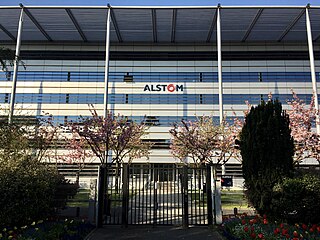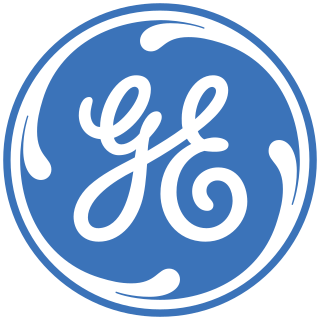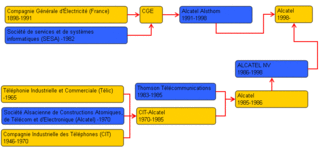Related Research Articles
Marconi Electronic Systems (MES), or GEC-Marconi as it was until 1998, was the defence arm of General Electric Company (GEC). It was demerged from GEC and bought by British Aerospace (BAe) on 30 November 1999 to form BAE Systems. GEC then renamed itself Marconi plc.
The General Electric Company (GEC) was a major British industrial conglomerate involved in consumer and defence electronics, communications, and engineering.

Alstom SA is a French multinational rolling stock manufacturer which operates worldwide in rail transport markets. It is active in the fields of passenger transportation, signaling, and locomotives, producing high-speed, suburban, regional and urban trains along with trams.

Elihu Thomson was an American engineer and inventor who was instrumental in the founding of major electrical companies in the United States, the United Kingdom and France.

Thorn Lighting Ltd, a subsidiary of the Zumtobel Group, is a global supplier of both outdoor and indoor luminaires and integrated controls.
British Thomson-Houston (BTH) was a British engineering and heavy industrial company, based at Rugby, Warwickshire, England. Originally founded to sell products from the Thomson-Houston Electric Company, it soon became a manufacturer using licences from the American company. They were known primarily for their electrical systems and steam turbines.

Allgemeine Elektricitäts-Gesellschaft AG was a German producer of electrical equipment. It was founded in 1883 by Emil Rathenau as the Deutsche Edison-Gesellschaft für angewandte Elektricität in Berlin.
The Marconi Company was a British telecommunications and engineering company that did business under that name from 1963 to 1987. Its roots were in the Wireless Telegraph & Signal Company founded by Italian inventor Guglielmo Marconi in 1897, which underwent several changes in name after mergers and acquisitions. The company was a pioneer of wireless long distance communication and mass media broadcasting, eventually becoming one of the UK's most successful manufacturing companies. In 1999, its defence equipment manufacturing division, Marconi Electronic Systems, merged with British Aerospace (BAe) to form BAE Systems. In 2006, financial difficulties led to the collapse of the remaining company, with the bulk of the business acquired by the Swedish telecommunications company, Ericsson.
Hotpoint is a brand of domestic appliances. Ownership of the brand is split between American company Whirlpool, which has the rights in Europe, Chinese company Haier, which has the rights in the Americas and Turkish company Arcelik which has rights in Russia and the CIS.
Metropolitan-Vickers, Metrovick, or Metrovicks, was a British heavy electrical engineering company of the early-to-mid 20th century formerly known as British Westinghouse. Highly diversified, it was particularly well known for its industrial electrical equipment such as generators, steam turbines, switchgear, transformers, electronics and railway traction equipment. Metrovick holds a place in history as the builders of the first commercial transistor computer, the Metrovick 950, and the first British axial-flow jet engine, the Metropolitan-Vickers F.2. Its factory in Trafford Park, Manchester, was for most of the 20th century one of the biggest and most important heavy engineering facilities in Britain and the world.
British Westinghouse Electrical and Manufacturing Company was a subsidiary of the Pittsburgh, US-based Westinghouse Electric and Manufacturing Company. British Westinghouse would become a subsidiary of Metropolitan-Vickers in 1919; and after Metropolitan-Vickers merged with British Thomson-Houston in 1929, it became part of Associated Electrical Industries (AEI) in 1959. Further consolidation saw AEI taken over by GEC in 1967.
The Thomson-Houston Electric Company was a manufacturing company that was one of the precursors of General Electric.

Siemens Brothers and Company Limited was an electrical engineering design and manufacturing business in London, England. It was first established as a branch in 1858 by a brother of the founder of the German electrical engineering firm Siemens & Halske. The principal works were at Woolwich where cables and light-current electrical apparatus were produced from 1863 until 1968. The site between the Thames Barrier and Woolwich Dockyard has retained several buildings of historic interest. New works were built at Stafford in 1903 and Dalston in 1908.

Rushey Mead is an area, suburb, electoral ward and administrative division of the city of Leicester, England. The population of the ward at the 2011 census was 15,962. It comprises the northern Leicester suburb of Rushey Mead in its entirety, as well as a part of the neighbouring area, suburb and electoral ward of Belgrave and historical parts of neighbouring Northfields and Thurmaston.
Paxman was a major British brand of diesel engines. Ownership has changed on a number of occasions since the company's formation in 1865, and the brand is now part of MAN Energy Solutions. At its peak, the Paxman works covered 23 acres (9.3 ha) and employed over 2,000 people. Early Paxman diesel engines carried the name Paxman Ricardo.
Morphy Richards is a British brand of electrical appliances headquartered in Swinton, in South Yorkshire, England. Its products were formerly made at its historic home of Mexborough, and in other facilities across the United Kingdom. However, since the 1990s, all of its manufacturing has been carried out in the Far East.

GE Power Conversion is an electrical engineering company and is a subsidiary of GE Power, part of General Electric. GE Power Conversion's global headquarters is located in the Paris-Saclay research-intensive and business cluster, south of Paris, in the Île-de-France region.
GEC Traction Limited was a British industrial company formed in 1972 which designed and manufactured electric traction equipment for railway rolling stock. The company had manufacturing sites at Manchester, Preston and Sheffield and was a wholly owned subsidiary of General Electric Company.
Ferguson, Pailin & Co. was an English electrical engineering company based in Higher Openshaw, Manchester. The company was established in 1913, by Samuel Ferguson and George Pailin to manufacture electrical switchgear.

Alcatel SA was a French telecommunications company.
References
- ↑ Rutherford, Brian A. (28 July 2006). "The AEI-GEC gap revisited". Accounting, Business & Financial History. 6 (2): 141–161. doi:10.1080/09585209600000036.
- ↑ AEI Cables Ltd., About us - Celebrating 175 glorious years, accessed 5 February 2021
- ↑ Employment Appeal Tribunal, AEI Cables Ltd. v GMB and others, 5 April 2013, accessed 5 February 2021